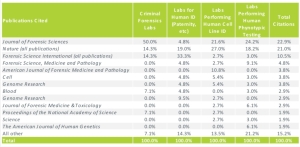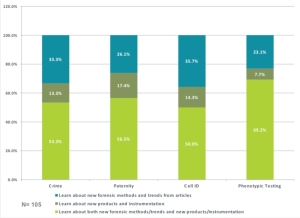Where do scientists charged with analyzing forensic DNA samples from crime scenes go when they want to stay current on new methods, trends and products? We recently learned it may not be the same place as other scientists undertaking similar tasks like DNA-based paternity testing, human cell line identification and human phenotype testing.
In a recent survey, we asked over 100 scientists in government, private, commercial and academic labs, all involved in some form of human identity testing, which scientific journals or publications they relied on most for forensic and human identification information. It is not surprising to see a number of forensic journals topping the list such as Journal of Forensic Sciences, Forensic Science International and even the research focused Nature. However, we also learned are few other things that weren’t so obvious:
- Specialized journals such as Journal of Forensic Sciences tends to be more popular with scientists in DNA crime labs and DNA based human phenotypic testing labs.
- Journals such as Forensic Science International and Nature are more popular with scientists working on DNA-based paternity testing and DNA-based human cell line identification and other non-crime related human identity (see Table: Publications for Human Identity).
Clearly, the objective of each end-user segment is different. Forensic DNA and paternity testing may well face the pointed scrutiny of the legal systems, while cell line identity and phenotypic testing may be subject to peer review and the focus of the publications will vary accordingly.
In general, scientists performing DNA-based identity testing rely on their favorite publications to learn about not only new methods and trends in their field but also to learn about new products and instruments (See Chart: Utility of Human ID Publications).
The take away is clear – if you want the attention of DNA-based human testing laboratories strive to have your methods and products described in the most relied on journals.




Leave a Reply